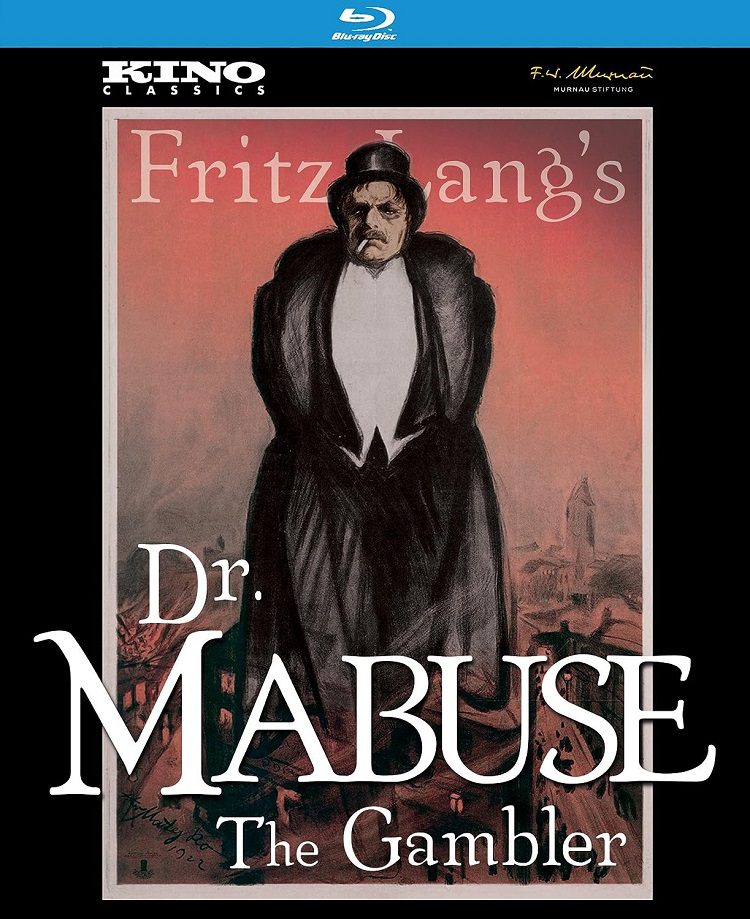
Based on the novel Dr Mabuse by Norbert Jacques, Dr. Mabuse, The Gambler is a two-part crime epic by legendary German film director Fritz Lang, and is the first in a trilogy that includes The Testament of Dr. Mabuse (1933) and The Thousand Eyes of Dr. Mabuse (1960). Running 270 minutes, the film, which was originally released in two parts, comes across nowadays like a TV miniseries, as the villainous Mabuse (Rudolf Klein-Rogge) attempts to stay ahead of state prosecutor Norbert von Wenk (Bernhard Goetzke) in this captivating thriller.
The Kino Classics Blu-ray presents the film on two discs. The story opens with the execution of a impressive criminal undertaking planned by Mabuse, a major figure in the German underworld, whose identity is unknown because he is a master of disguise. Rather than a straightforward robbery, Mabuse has his men steal a secret trade pact between Holland and Switzerland. When word gets out, stock-market investors panic on the floor, seen scurrying around like insects. Standing above the chaos is a calm Mabuse, who buys up the devalued stocks, and when the pact is “found,” he begins to sell, turning a huge profit.
Mabuse has a civilian identity as a professor of psychoanalysis. He lectures on its benefits and is a master hypnotist. He uses that skill to manipulate people and steal from them. In a very hokey, inaccurate portrayal of hypnosis, a disguised Mabuse stares at Edgar Hull, son of a wealthy man, across a dance hall and casts him under his spell. Mabuse gets Edgar to bring him into an exclusive club where they play cards with Edgar purposely losing against his will. Once Mabuse leaves, Edgar falls out of his control and is left confused by what happened.
There have been a string of these incidents. Von Wenk wants to use Edgar to catch Mabuse, and Mabuse uses Folies Bergère dancer Cara Carozza, who is in love with Mabuse, to get close to Edgar. While each in disguise, von Wenk and Mabuse unknowingly encounter each other at a card club. Mabuse uses his glasses and a light reflection, in a more believable attempt, to hypnotize, but von Wenk’s will power keeps him free. Mabuse is a ruthless man, with no qualms about eliminating anyone who gets in his way or who poses a threat to his freedom, including von Wenk. As they close in on each other, there’s a great scene between Klein-Rogge and Goetzke as their characters act around each other in von Wenk’s office.
The script by Thea von Harbou is well written. It is filled with a slew of interesting characters and the plot takes many believable turns as Mabuse and von Wenk alternate getting the upper hand. The ending is not obvious but is certainly satisfying.
The video has been given a 1080p/MPEG-4 AVC encoded transfer displayed at an aspect ratio of 1.33:1. Title cards reveal “the photochemical restoration of this film was performed in 2000 by the Friedrich-Wilhelm-Murnau-Stiftung in Wiesbaden, using as its foundation the original camera negative of the German distribution version and a negative of the export version, held by the Bundesarchiv-Filmarchiv of Berlin. This version conforms to a 1991 reconstruction by the Filmmuseum Munchen. The intertitles were derived from the negatvces. Missing, damaged, or incomplete titles have been corrected and supplemented with the help of censorship documents. The resulting master negatives were the basis for this 2k digital restoration.”
The blacks are inky, and grays are solid. Whites tend to be good but they bloom on occasion. Film grain is noticeable, overly so during the stock-market sequence. Spots, marks, and vertical lines appear throughout and there are some instances of flicker. Hair can be seen on right side of the frame when a henchman visits Carozza in prison.
The audio is available in LPCM 2.0 and presents composer Aljoscha Zimmermann’s robust score. The instruments come through with good clarity and separation. The track sounds free of wear and defect.
The lone extra is the three-part “The Story Behind Dr. Mabuse” (HD, 53 min), which looks at “The Music of Mabuse,” the career of author Norbert Jacques, and “Mabuse’s Motives,” which includes Lang in archival interviews.
Kino’s Dr. Mabuse, The Gambler is a safe bet for silent-film fans. The nearly 100-year-old movie remains engaging and the Blu-ray’s HD presentation is pleasing. Recommended.